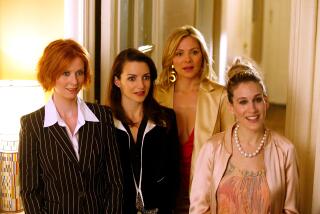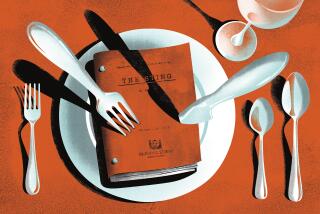A wild but humorous life
As Carrie Fisher explains it early in this brisk, entertaining adaptation of her 2006 one-woman stage show, she had famous parents. Debbie Reynolds was the beloved star of “Singin’ in the Rain” who possessed a vast storehouse of clothing in her Beverly Hills closet and could always be relied upon to transform herself into a movie star before her astonished children’s eyes. Eddie Fisher was a crooner who bedded Elizabeth Taylor, among many others, and later wrote a memoir about his conquests, and was almost entirely absent from Carrie’s childhood.
Of course, the irony is that although Reynolds and Fisher were the “Brad Pitt and Jennifer Aniston” of their day, as Fisher puts it, thanks to a taciturn, weirdo visionary named George Lucas, Carrie Fisher has achieved an iconic fame that blows her parents’ out of the water. Sure, plenty of people still remember Debbie and Eddie and the Golden Age of faux-domestic Hollywood glamour they symbolized. They were big stars, matinee idols and celebrity magazine mainstays. But they weren’t Princess Leia.
Readers are now familiar with Fisher’s authorial personality, as it has been worked out in hilarious personal sendups such as “Postcards From the Edge” (made into a 1990 film directed by Mike Nichols and starring Meryl Streep and Shirley MacLaine), “Surrender the Pink,” “Delusions of Grandma” and “The Best Awful.” This run proves, if nothing else, Fisher has a knack for titles. But she also has a talent for lacerating insight that masquerades as carefree self-deprecation.
Jagged sensibility
In this sense, Princess Leia, far from being the albatross around her neck, is the key to her soul. You’d be hard-pressed to find someone better to inhabit this irritable, petulant example of intergalactic royalty. In the “Star Wars” movies, Fisher’s jagged sensibility is on display, whether jousting with Harrison Ford’s space cowboy, expressing dismay at Mark Hamill’s cosmic Boy Scout or staring down a malevolent Lord Vader. It makes perfect sense that the cover of “Wishful Drinking” depicts a head-bowed Leia, emptied martini glass in hand, with a handful of pills scattered nearby.
However, Fisher never makes it clear what exactly her main problem is -- or even what the correct clinical diagnosis for her various addictions might be. Does she blame booze? Drugs? Sex? Failure to follow the Alcoholics Anonymous program? Reluctance to make rehab a success? We even learn that Fisher has gone through electroconvulsive treatment, which is, of course, a fairly hard-core approach to dealing with mental illness and has the troubling side effect of obliterating memories. What emerges from all this is less a central revelation than a Gestalt of damage, and both Fisher’s show and the subsequent book represent an effort to document it.
The effect, ultimately, is extraordinarily painful while being extremely entertaining. This is Fisher’s distinctive trick and what has kept her going in Hollywood for decades. No one has any doubt that, at a given time, she might be in serious trouble, but because she lacks grandiosity, it doesn’t matter how many times she’s had her stomach pumped. She always has an angle on her suffering, whether its enduring the legacy of perhaps the most strange and humiliating scene a young actress could -- the infamous metallic bikini moment from “Return of the Jedi,” when Princess Leia was chained to a giant, slobbering puppet -- or dealing with the emotional consequences of her brief marriage to musician Paul Simon.
Font of material
Ultimately, Fisher has no desire whatsoever to make readers feel sorry for her, and doesn’t think they should. For her entire life, she has seen herself and the catastrophe of her personality as a deeply amusing wellspring of great material. Unlike her parents, she isn’t so much an extremely famous person as an incredibly popular character. As she points out, Princess Leia is more than a girl who joined the Rebel Alliance to defeat the evil Empire, then had her home planet blown up by the Death Star: Leia is a doll, a shampoo bottle, a cartoon, a white dress with no bra underneath (Lucas insisted, for ornate reasons, that there was no underwear in space). Fisher, by contrast, is not a merchandising phenomenon: She’s relentlessly real and completely unexpurgated, often too much so for her own good, despite her insistence that she likes “to quote fictional characters, because I’m something of a fictional character myself!”
You could say this book is a blistering stream of witty comments, or a dazzling romp through the experiences of a woman who once sought drug-addiction counsel from Cary Grant. But it isn’t really about any of that. It’s about the dizzying, dissonant music of Carrie Fisher’s existence. It is in fact about “Star Wars,” a pop-culture tsunami so vast that it has warped the universe in ways no one could have predicted. Fisher was only 19 when she first donned the soon-to-be infamous Princess Leia hairstyle. She couldn’t have known what she was getting into. None of us did. But she’s done her best to make sense of it all, and throughout, her humor has held up. In her own defiant manner, she’s fought the good fight.
“[M]y entire existence could be summed up in one phrase,” she writes. “And that is: If my life wasn’t funny it would just be true, and that is unacceptable.”
More to Read
Only good movies
Get the Indie Focus newsletter, Mark Olsen's weekly guide to the world of cinema.
You may occasionally receive promotional content from the Los Angeles Times.









